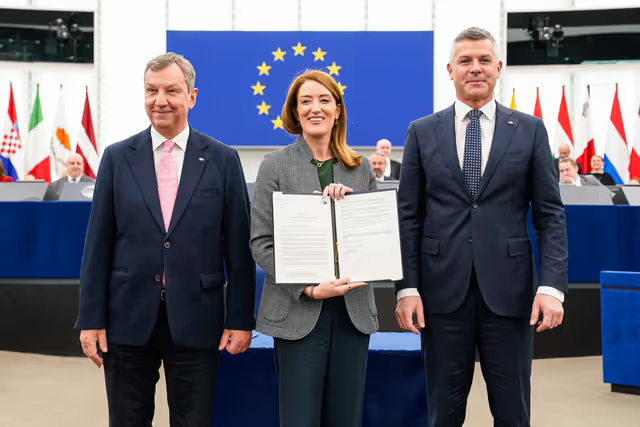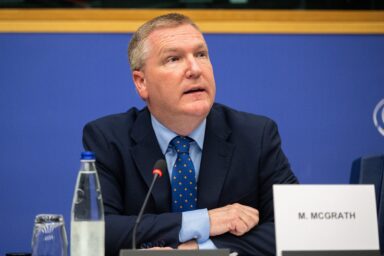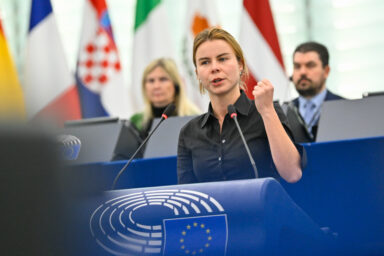The parliamentary cake remains whole while the council dog is fed as European lawmakers approve the European Union‘s 2026 budget. The Parliament-Council compromise on immediate spending priorities allows the measure to take effect on New Year’s Day.
MEPs approved the joint text of the annual budget on Wednesday, 26 November with 419 votes in favour, 185 against, and 53 abstentions. The vote means the parliament succeeded in restoring much of the funding that the Council had cut, while the Council managed to keep the overall budget within its preferred limits. It finalised the so-called conciliation process, during which the Council adopted the joint text on 24 November 2025. Upon both approvals, the budget is to enter force on 1 January 2026.
Wednesday’s was an all-smiles affair. Denmark’s EU minister Marie Bjerre congratulated everybody involved with her trademark radiant smile. Parliament President Roberta Metsola signed the budget on the spot, earning a measure of applause. Even the co-rapporteurs, Matjaž Nemec (S&D/SVN) and Andrzej Halicki (EPP/POL) basked in the afterglow for a few joyous moments.
Dancing at two weddings
Following the European Parliament’s adoption of amendments to the Council’s position on the draft budget in October 2025, a 21-day conciliation period was triggered. The Conciliation Committee convened its first meeting on 4 November 2025, with subsequent meetings on 14 and 15 November, working to reconcile the differing positions of Parliament and Council.
Negotiations balanced political priorities against fiscal discipline and member states’ reservations. The main disputes that needed resolving centred on the overall budget size and the distribution of funds across key programmes. The European Parliament had pushed for a larger budget than the Council, seeking to better match spending with the Union’s priorities. Parliament’s proposed figure was around €193.9bn in commitments, exceeding the Council’s position by nearly €1.3bn.
You might be interested
Parliament objected particularly to Council cuts in flagship programmes such as Horizon Europe (research and innovation), the Connecting Europe Facility (digital infrastructure), and Erasmus+ (student mobility). The Council’s cuts, in the region of €1.52bn overall for 2025 and similarly for 2026, triggered calls within Parliament to restore these funds to preserve the EU’s ability to deliver on its promises.
A restart avoided
Another prominent bone of contention involved financing obligations related to the EU Recovery Instrument. Parliament stressed that repayment of borrowing costs is a legal obligation and cautioned against arbitrary budget shifts to cover these costs, as this could undermine programme funds.
Among the specific programmes gaining additional funding in negotiations were climate action (LIFE), transport and energy networks, humanitarian aid, European neighbourhood policy, and civil protection. Parliament secured millions of euros in top-ups to these areas to uphold strategic political priorities.
The conciliation period officially ran until 17 November 2025. During this time, negotiators reached an agreement on a joint text resolving most disputes. This joint text was forwarded to both institutions on 15 November, commencing a 14-day period for formal approval by the European Parliament and the Council. Without the conciliation, the Commission would have had to propose a new draft budget to restart the procedure.











